news feed
October 2020 — Our work on moderating physical activity goals will be published in the Proceedings of the ACM on Interactive, Mobile, Wearable and Ubiquitous Technologies, IMWUT.
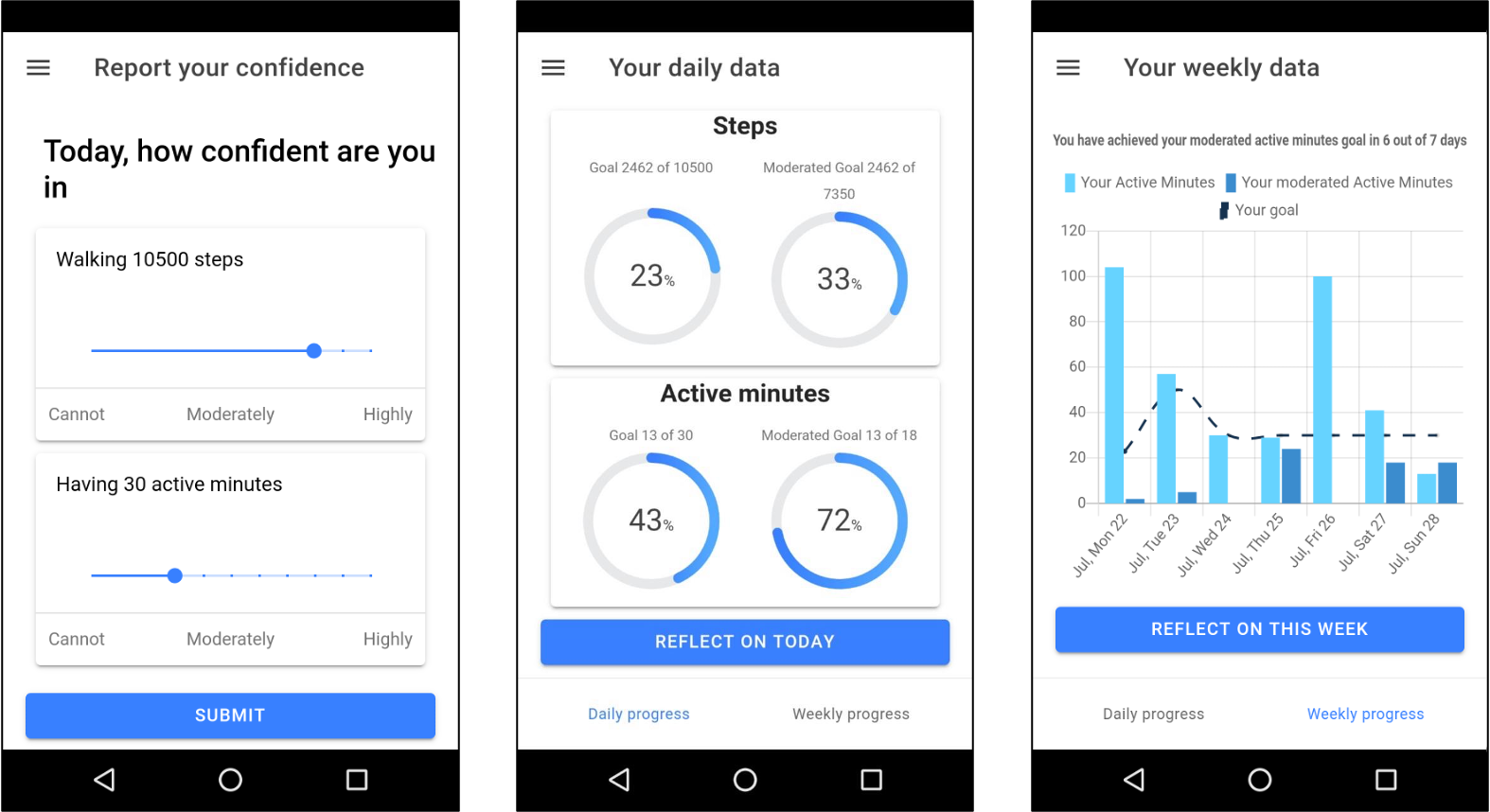
As a follow up to our work on reflection under uncertainty in self-tracking systems we developed FitReflect, a mobile app that provides a moderated secondary goal which is informed by the confidence of users in attaining their primary goals. A four week experiment suggests that moderated goals make users to update their primary goals more often and align their goals with their physical activity. Consequently, we observe an increase in the achievement rate and satisfaction of users.
July 2019 — The International Journal of Medical Informatics (IJMI) accepted our work on modeling the interactive behaviour of the users of a medication safety dashboard.
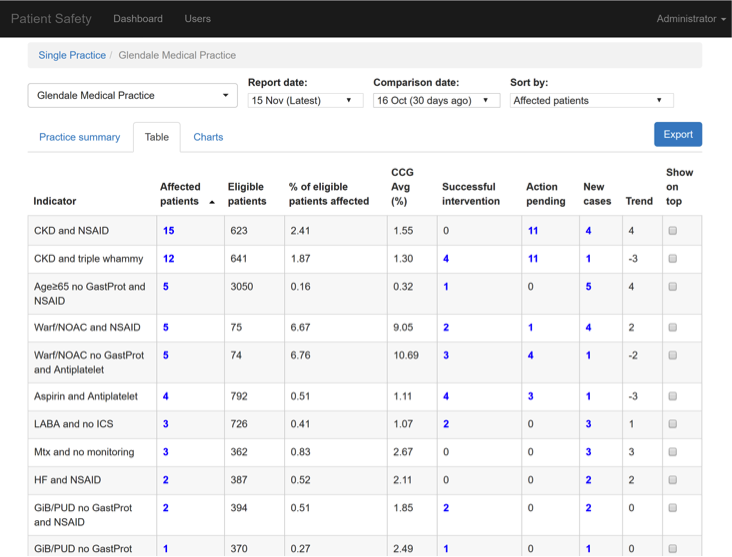
We conducted a 10-month observational study in which 35 health professionals used a medication safety dashboard for audit and feedback purposes in clinical practice as part of a wider intervention study. We modelled user interaction by computing features representing exploration and dwell time through user interface events. Supervised learning algorithms suggests that it is possible to classify pharmacists against GPs (accuracy > 0.8) using mouse clicks, mouse hovers and timestamps. Our work opens up new research avenues into providing adaptations on a complex healthcare system.
June 2019 — The International Journal of Human-Computer Studies (IJHCS) publishes our work on WevQuery for Pattern Mining (WevQuery-PM).
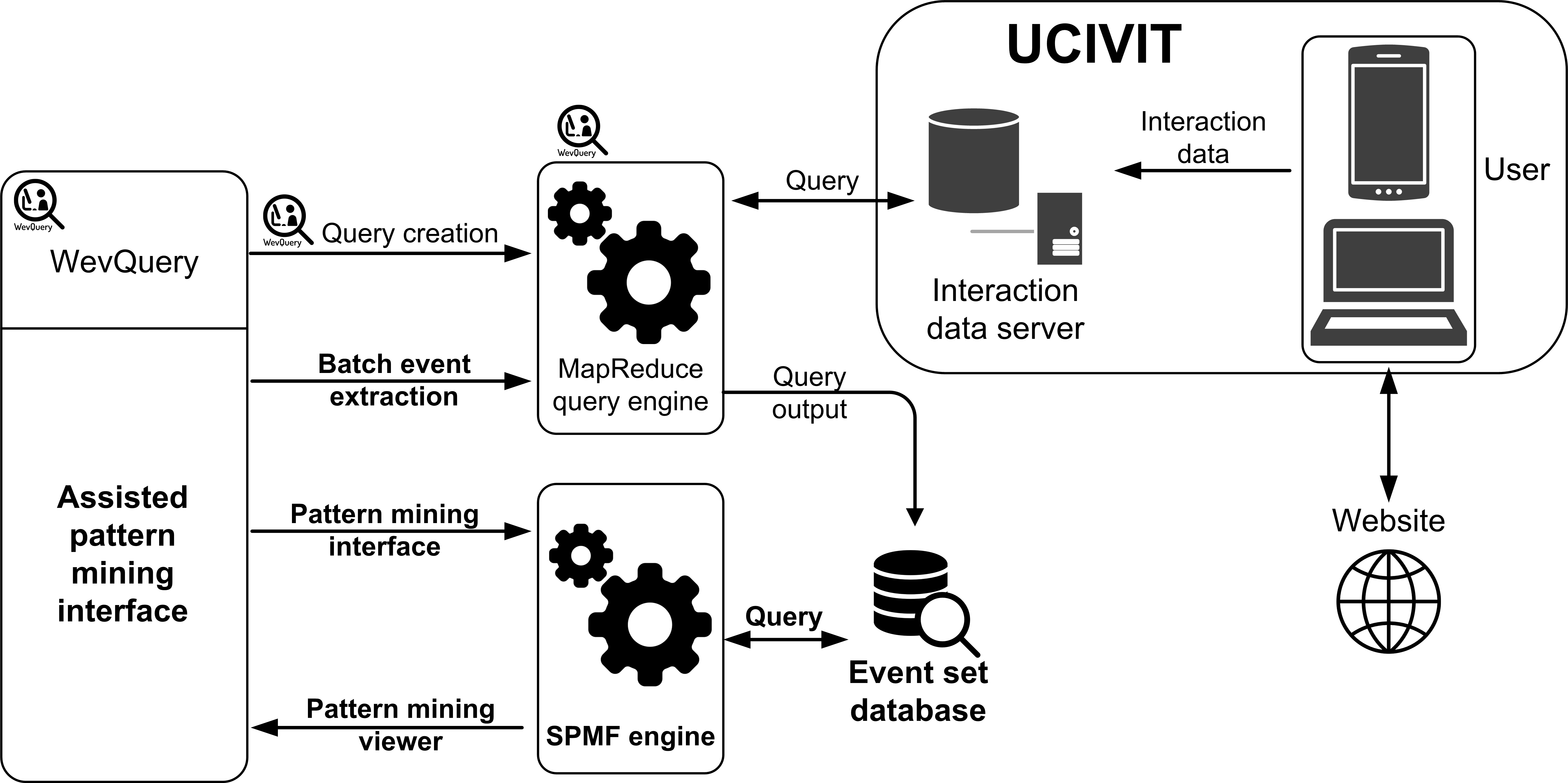
WevQuery-PM enables non data-savvy individuals to subset, customise and query large datasets of fine-grained interaction data including mouse clicks and key presses. We report the system and a user study indicating that WevQuery-PM supports users in formulating hypotheses about how Web systems are being used and feed the hypotheses back for further testing.
December 2018 — A paper describing the MOVING platform was published in IEEE Multimedia.

We argue how the MOVING EU H2020 Project addresses the need of interactive learning platforms that enable open innovation. We describe how our approach relies on the Big Data paradigm for content indexing and learner interaction analytics. The paper will be published in the Special Issue on 'Multimedia Big Data Analytics in Technology Enhanced Learning'.
September 2018 — A paper describing three studies we ran to identify ontology authoring workflows in a data-driven fashion was accepted to the Journal of Web Semantics.
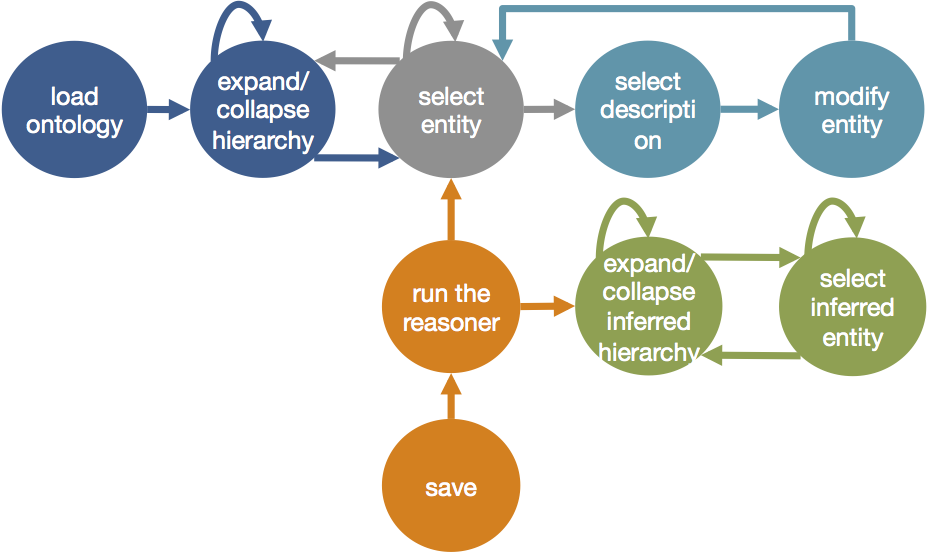
We run three studies with ontology authors addressing the continuum of expertise (from intermediate to expert users), the type of tasks (whether they are free-form or prescriptive) and the effect of the location (laboratory, tutorial or on their own) and how the studies are administered (whether or not there is a close supervision). While there are activity workflows that are particular to settings, the results indicate a number of core workflows that are common to all of them.
February 2018 — Inferring Visual Behaviour from User Interaction Data on a Medical Dashboard will be presented at the Digital Health 2018 conference at WWW in Lyon, France.
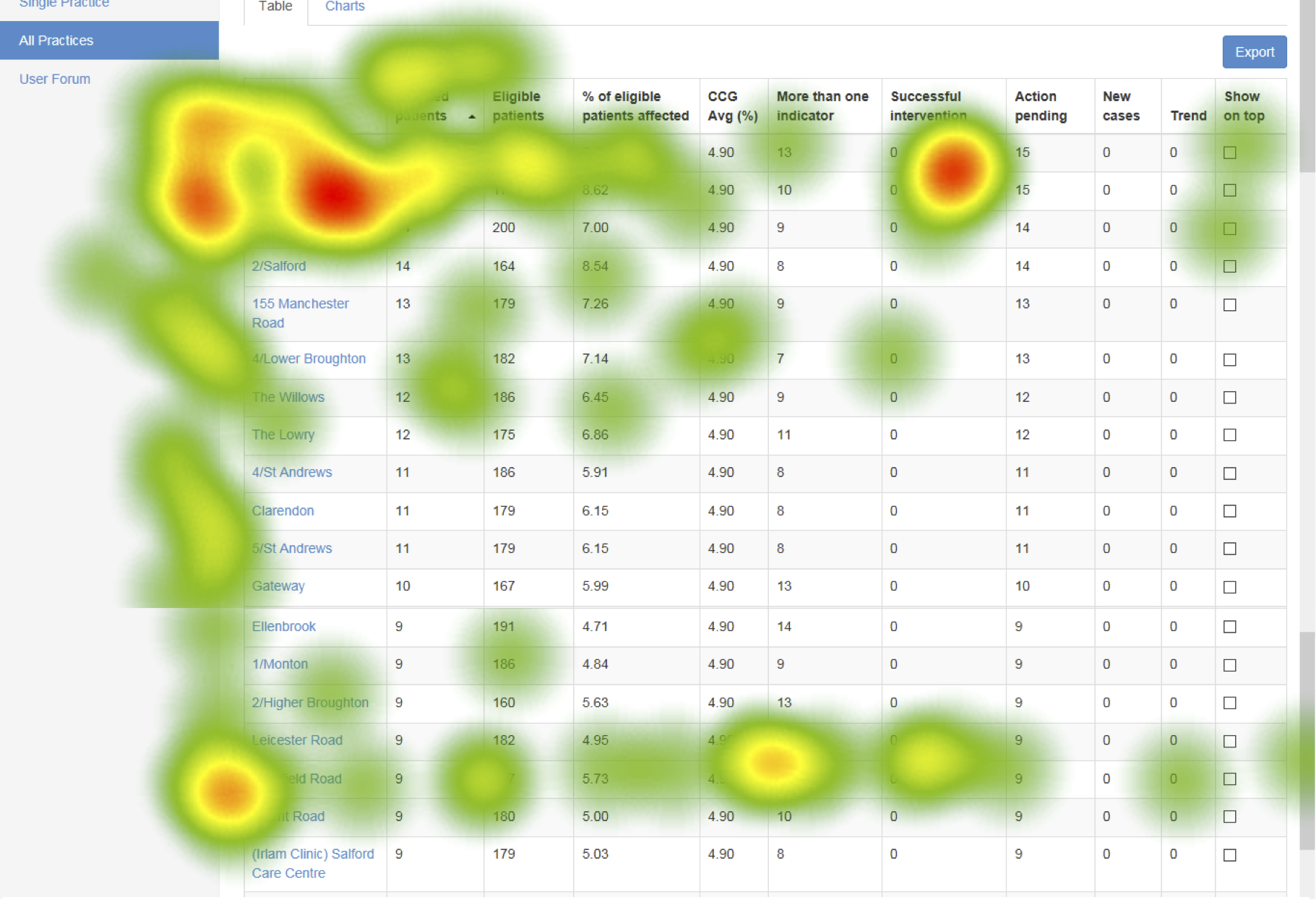
We run a lab (N=6) and an observational remote study (N=35) on SMASH, a pharmacist-led intervention for safe prescribing of medications in primary care. Here, we address the question of whether we can infer visual behaviour through user interaction data. Our findings suggest that, there is indeed a relationship between the use of the mouse (in terms of clickstreams and mouse hovers) and visual behaviour in terms of cognitive load. We discuss the implications for the design of adaptive medical dashboards.
December 2017 — Britain Breathing: using the experience sampling method to collect the seasonal allergy symptoms of a country has been published at the Journal of the American Medical Informatics Association (JAMIA).

The contributions of the paper are twofold: first, we establish that the experience sampling method (i.e. users reporting their own symptoms) is a a reliable method to infer the incidence of seasonal allergies. This was suggested by the strong correlation between the number of antihistamines prescribed by General Practitioners and the lack of well-being reported by allergy sufferers. Second, we found that nasal symptoms reported (ie. a blocked up nose) were the factor most strongly related to overall well-being. Also those who had taken medication for their allergies still reported feeling worse compared with people who hadn't taken medication.
This analysis corresponds to 2016 data but the Britain Breathing project is still running and anybody can become a citizen scientist by participanting in the project. Download the app (Android and iOS) if you want to contribute!
July 2017 — The Usability of Task Modeling Tools paper was accepted to the IEEE Symposium on Visual Languages and Human-Centric Computing, VL/HCC 2017. This paper is the outcome of a collaboration with the Human Interfaces in Information Systems Laboratory of the National Research Council of Italy, CNR.
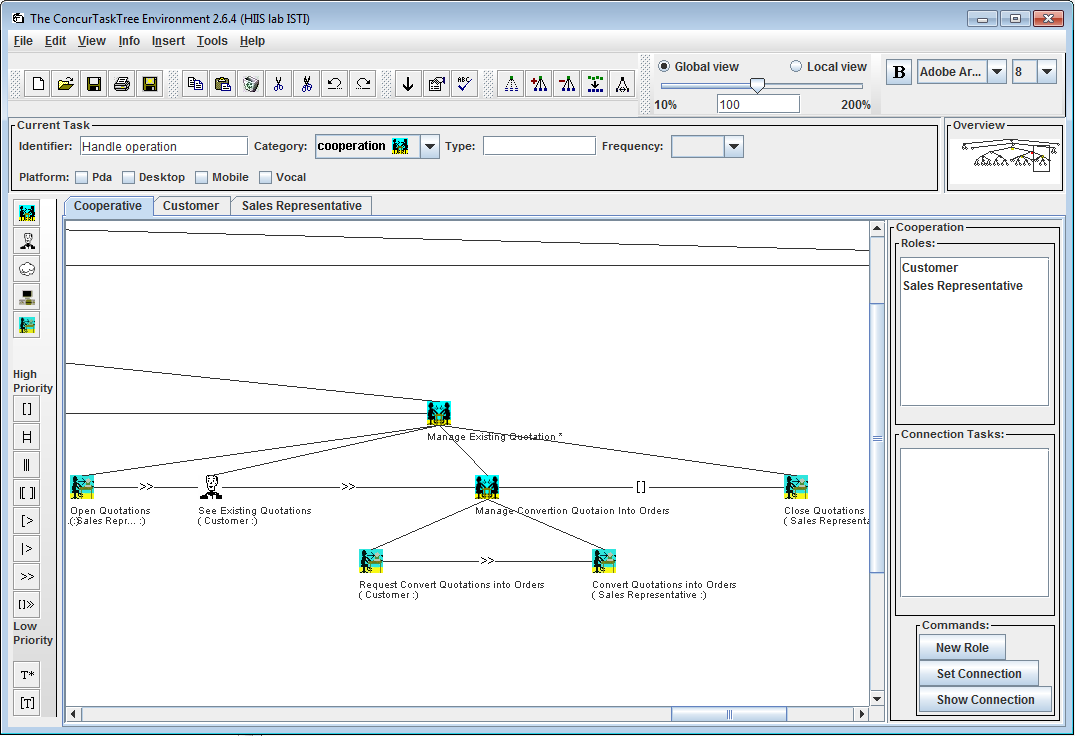
We ran a user study on an instrumented ConcurTaskTrees Environment (CTTE) to isolate the problems encountered by designers, identify the workarounds employed to overcome such problems and understand the workflows exhibited. The analysis of the logged user interface events and eye-tracking data uncovers five workflows that illustrate how the task model hierarchy is populated and edited, operators are added to tasks, and when model consistency is checked. These findings inform design implications for task modeling tools and formulate hypotheses for future work.
July 2017 — We got the best paper award at the 9th ACM SIGCHI Symposium on Engineering Interactive Computing Systems, EICS 2017.
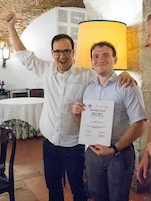

We are very happy to receive the best paper award for our paper WevQuery: Testing Hypotheses about Web Interaction Patterns at EICS 2017 in Lisbon (Portugal). The Programme Chair, Jeffrey Nichols from Google, made the announcement during the conference dinner. The paper has been published in the first issue of the Proceedings of the ACM on Human-Computer Interaction.
April 2017 — Paper accepted to the 9th ACM SIGCHI Symposium on Engineering Interactive Computing Systems, EICS 2017: WevQuery: Testing Hypotheses about Web Interaction Patterns.
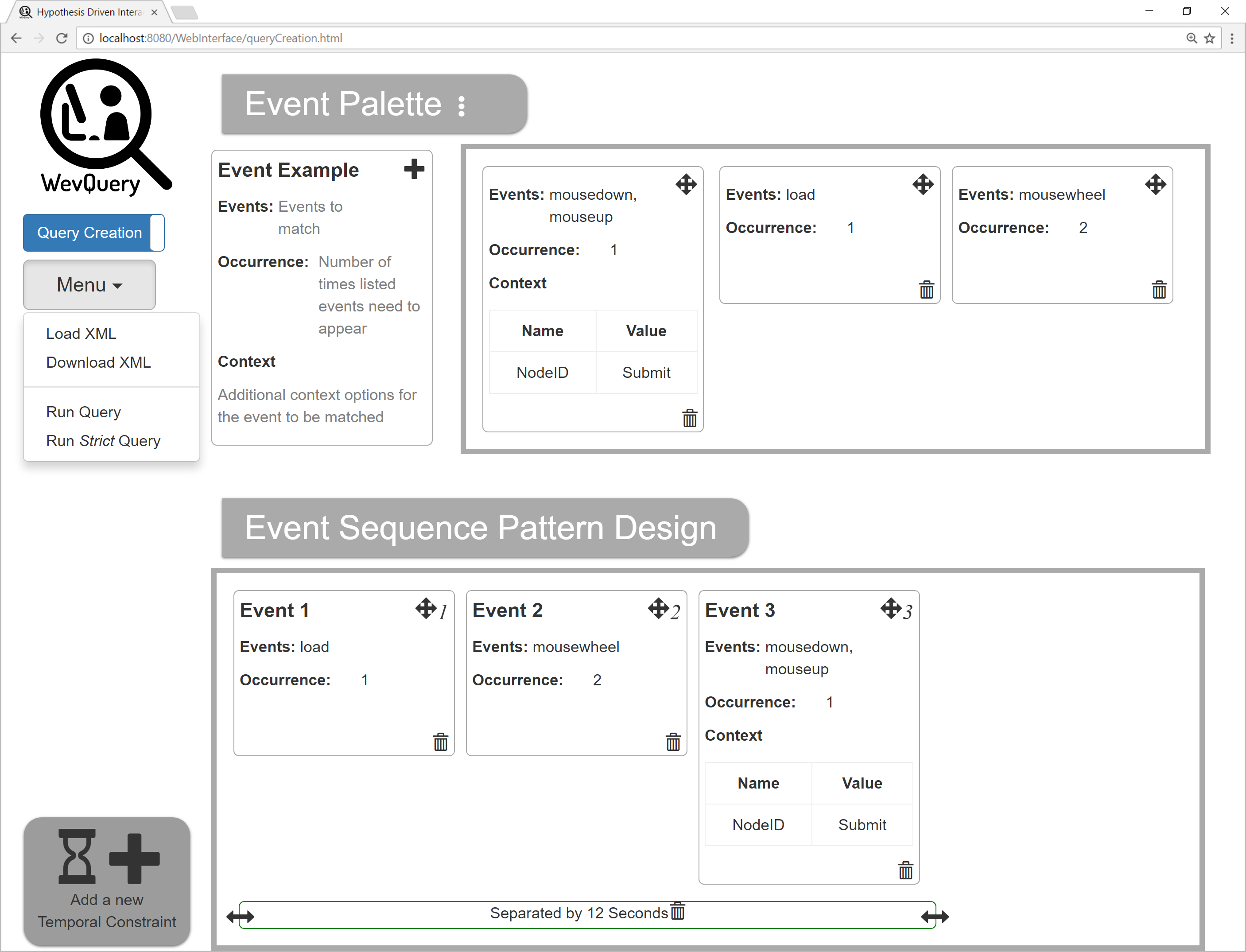
WevQuery is a scalable system to query user interaction logs in order to allow designers to test their hypotheses about users' behaviour. WevQuery supports this purpose using a graphical notation to define the interaction patterns designers are seeking. WevQuery is scalable as the queries can then be executed against large user interaction datasets by employing the MapReduce paradigm. We showcase the potential of WevQuery, from the design of the queries to their execution on real interaction data accounting for 5.7m events generated by 2,445 unique users.
January 2017 — Paper accepted to the International Journal of Human-Computer Studies: Real-Time Detection of Navigation Problems on the World 'Wild' Web.
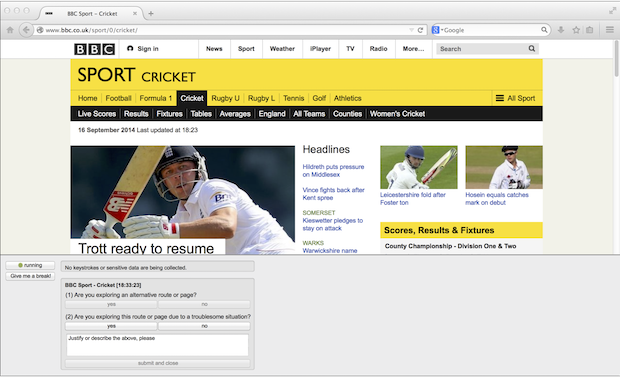
We propose (and empirically validate in the field) a set of algorithms to detect Web navigation problems in real time. This approach is ground-breaking in that existing approaches are applied on a post hoc basis, which are resource consuming and prevent a prompt intervention to repair the cause of problems. Our work opens up new avenues to real time delivery of support and adaptive web interventions to alleviate the detected problems.
September 2016 — Paper accepted to EKAW: "Making Entailment Set Changes Explicit Improves the Understanding of Consequences of Ontology Authoring Actions".
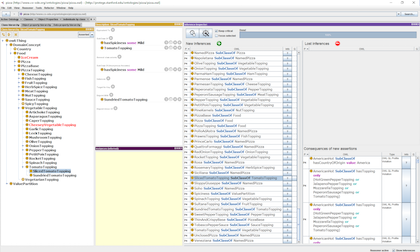
When authoring ontologies, one single authoring action can have a number of implicit consequences that are difficult to grasp. This is a known problem for those who build ontologies. In this paper we address this problem by engineering a tool, the 'Inference Inspector' that makes this implicit changes not only explicit, but also understandable and actionable. We empirically suggest the effectiveness of our approach in two experiments with ontology authors.
March 2016 — Two journal papers accepted: Exploring the relationship between web accessibility and user experience was accepted to the International Journal of Human-Computer Studies. Group versus Individual Web Accessibility Evaluations: Effects with Novice Evaluators was accepted to Interacting with Computers.
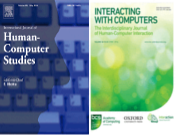
In the "Exploring the relationship..." paper we found that perceived Web accessibility is significantly correlated with UX, while the relationship between UX and conformance to WCAG 2.0 is more elusive.
In the "Group versus Individual..." paper we found that employing a group of two people is more useful than having individuals carrying out the assessment in order to reduce the false negatives rate.
December 2015 — Paper accepted: we got a paper accepted to CHI 2016: To Sign Up, or not to Sign Up? Maximizing Citizen Science Contribution Rates through Optional Registration.

We run an A/B testing experiment on Reading Nature's Library citizen science platform and we found that optional registration maximizes citizen science contribution rates.
November 2015 — New project: I'm happy to announce that the EU H2020 programme is going to fund the MOVING project with ~€3.5M during 3 years.

Through this project we will enable users to improve their information literacy by training how to use, choose, reflect and evaluate data mining methods in connection with their daily research tasks and to become data-savvy information professionals. I'm the University of Manchester PI in a consortium with 9 project partners across 6 countries led by the Centre for Research and Technology-Hellas (CERTH) and includes The German National Library of Economics, Ernst & Young and The Leibniz Institute for the Social Sciences among others.